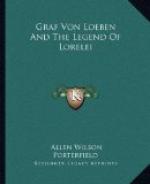collapses, for this MS cannot be produced, not even by Bender who
claims to have found it. See Cardauns, pp. 60-67. Reinhold Steig
reviewed Cardauns’ book in Euphorion (1896, pp. 791-99)
without taking in the question as to the originality of Brentano’s
ballad.
[96] P. 224.
[97] In Geibel’s Gesammelte Werke, VI.
106-74, Geibel wrote the
libretto for Felix Mendelssohn
in 1846. Mendelssohn died before
finishing it; Max Bruch completed
the opera independently in
1863. It has also been
set to music by two obscure composers. Karl
Goedeke gives a very unsatisfactory
discussion of the matter in
Emanuel Geibel, Stuttgart,
1860. pp. 307 ff.
[98] Hermann Seeliger says (p. 73): “Zu
den Bearbeitungen, die sich an
die Ballade von Brentano anlehnen,
gehOeren die Dichtungen von
Geibel, Mohr, Roquette, Hillemacher,
Fiebach und Sommer.” Seeliger
wrote his study for musicians,
and his statement may be correct.
[99] Aside from the treatises on the Lorelei already
mentioned, there
are the following: Zu
Heines Balladen und Romanzen, by
Oskar Netoliczka, Kronstadt,
1891; this study does not treat the
Lorelei; Die Lurleisage,
by F. Rehorn, Frankfurt am Main,
1891; Sagen und Geschichten
des Rheinlandes, by Karl Geib,
Mannheim, 1836; the work is
naturally long since superseded;
KOelnische Zeitung
of July 12, 1867, by H. Grieben;
KOelnische Zeitung
of 1855, by H. DUentzer; H. Heine, ein
Vortrag, by H. Sintenis,
pp. 21-26; Die Lorelei: Die
Loreleidichtungen mit besonderer
RUecksicht auf die Ballade von
Heinr. Heine, by
C. L. Leimbach, WolfenbUettel, 1879. The last
six of these works were not
accessible, but, since they are quoted
by the accessible studies,
it seems that they offer nothing
new. (The writer has since
secured Leimbach’s treatise of 50 small
pages. It offers nothing
new.)
[100] Adolf Seybert in his Die Loreleisage,
Wiesbaden, 1863 and
1872 (Programm), contends
that Frau Holla and the Lorelei are
related. Fritz Strich
in his Die Mythologie in der deutschen
Literatur von Klopstock bis
Wagner, Halle, 1910, says
(pp. 307-9) that Brentano’s
ballad is “eine mythologische
Erfindung Brentanos, zu der
ihn der echoreiche Felsen dieses
Namens bei Bacharach anregte.”
He also says: “Ob nicht Heines Lied
auf Brentanos Phantasie zurUeckgewirkt
haben mag?” The reference is
to Brentano’s MAerchen.
Strich’s book contains a detailed
account of the use of mythology
in Heine, Loeben, and Brentano.
[101] Hermann Seeliger says (p. 8): “Ich
meine, die ganze romantische
Schule hAette ohne den Stoff
vom Volke zu bekommen, ein Gedicht von
solcher SchOenheit wie das
von Brentano weder gemacht noch machen
kOennen.” Vis-a-vis
such a statement, sociability ceases.




